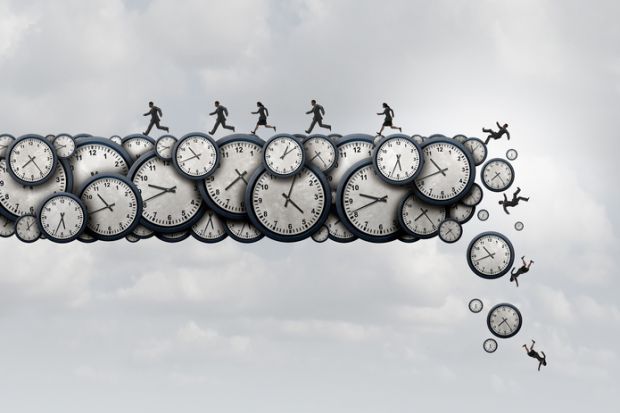Fresh calls have been made to tackle a crisis of overwork and poor mental health in academia in the wake of two worrying new studies.
US academics who conducted a global survey found that postgraduate students were more than six times more likely to experience depression or anxiety compared with the general population, with female researchers being worst affected.
Meanwhile, a survey of more than 5,500 staff in Norwegian universities found that academics reported higher levels of workaholism than their administrative colleagues and revealed that the group appears to be among the occupations most prone to workaholism in society as a whole. Young and female academics were more likely than their senior colleagues to indicate that this had an impact on their family life.
The fresh evidence comes after Times Higher Education’s first Work-Life Balance Survey, published in February, revealed that university staff around the world reported feeling overworked and underpaid, and believed that their careers had a detrimental impact on relationships with friends, families and partners.
Steffen Torp, co-author of the Norwegian study and a professor in the Faculty of Health and Social Sciences at the University College of Southeast Norway, said that higher education leaders had to make tackling overwork and poor mental health a priority.
“Academics have a lot of freedom to work whenever and wherever they want. These days, however, there seems to be more and more pressure to publish and acquire funding,” Professor Torp said.
“At the core of this issue is the idea that universities should be earning money – like an ordinary enterprise. Politicians and university leaders must be aware of how this affects the work of academics, both in terms of their health and research.”
For the postgraduate study, researchers at the University of Texas Health Science Center at San Antonio, St Mary’s University and the University of Kentucky questioned 2,279 postgraduates – 90 per cent of them pursuing a PhD – from a range of countries and disciplines about their mental health.
Writing in Nature Biotechnology, they say that 41 per cent of postgraduates scored as having severe or moderate anxiety, and 39 per cent had moderate to severe depression. In the general population, the figure is 6 per cent for both.
Women were significantly more likely to experience anxiety (43 per cent) and depression (41 per cent) than men (34 and 35 per cent, respectively).
Students who scored as having anxiety or depression were much more likely to say that they had a poor work-life balance, or to say that their supervisor did not provide ample support.
Lindsay Bira, assistant professor of psychiatry at UT Health San Antonio and one of the paper’s co-authors, said that it was “not surprising that such a stressful high-intensity environment would lead to a bigger report of mental health symptoms”.
“I think anyone who has been through the process – including myself and my co-authors – is willing to admit that we all experience stress and mental health symptoms at a higher extent when we are in such a pressure-cooker environment,” she said.
The paper says that academics must challenge the culture “where it is frowned upon to leave the laboratory before the sun goes down” and where competition for funding is all-consuming, and should “set a tone of self-care as well as an efficient and mindful work ethic”.
In the Norwegian study, published in Higher Education, academics described levels of workaholism that were similar to the most badly affected occupations considered in similar, previous studies.
“Overloaded” requirements placed on them at work were most commonly blamed, with workaholic respondents – particularly younger or female academics – being more likely to report that they struggled to balance their family and work lives.
Register to continue
Why register?
- Registration is free and only takes a moment
- Once registered, you can read 3 articles a month
- Sign up for our newsletter
Subscribe
Or subscribe for unlimited access to:
- Unlimited access to news, views, insights & reviews
- Digital editions
- Digital access to THE’s university and college rankings analysis
Already registered or a current subscriber? Login








